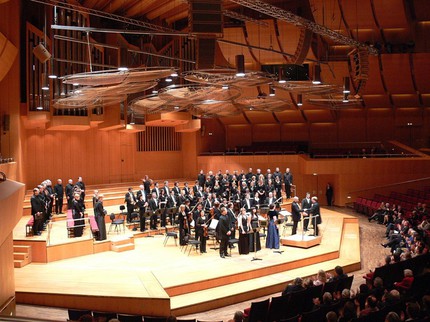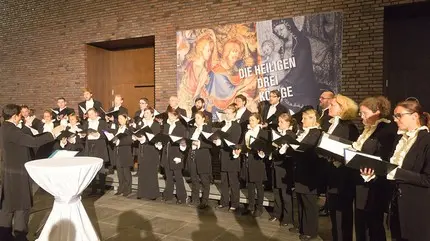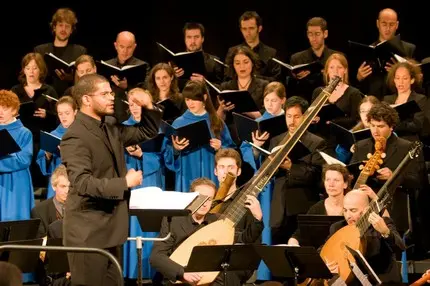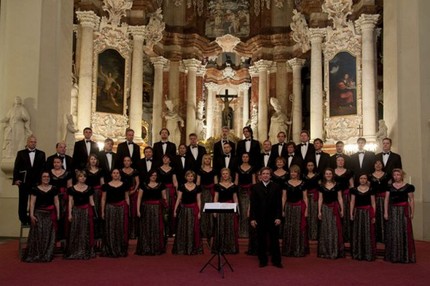
Munich Bach Choir (Münchener Bach-Chor) |
Munich Bach Choir

The history of the Munich Bach Choir dates back to the early 1950s, when a small amateur ensemble called the Heinrich Schütz Circle arose in the capital of Bavaria to promote early music. In 1954, the ensemble was transformed into a professional choir and received its current name. Almost simultaneously with the choir, the Munich Bach Orchestra was formed. Both ensembles were led by a young conductor and organist, a graduate of the Leipzig Conservatory Karl Richter. He considered the main task to popularize Bach’s music. During 1955, the Passion according to John and Passion according to Matthew, the Mass in B minor, the Christmas Oratorio, 18 church cantatas, motets, organ and chamber music of the composer were performed.
Thanks to the interpretations of Bach’s works, the choir won recognition first at home and then abroad. Beginning in 1956, the choir and maestro Richter regularly took part in the Bach Festival in Ansbach, which at that time was a meeting place for the musical elite of the whole world. The first tours to France and Italy soon followed. From the mid-60s, the active touring activity of the group began (Italy, USA, France, Finland, England, Austria, Canada, Switzerland, Japan, Greece, Yugoslavia, Spain, Luxembourg …). In 1968 and 1970 the choir traveled to the Soviet Union.
Gradually, the choir’s repertoire was enriched with the music of the old masters, the works of the romantics (Brahms, Bruckner, Reger) and the works of composers of the XNUMXth century (H. Distler, E. Pepping, Z. Kodaly, G. Kaminsky).
In 1955, the choir recorded the first gramophone record with works by Bach, Handel and Mozart, and three years later, in 1958, a 20-year collaboration with the Deutsche Grammophon recording company began.
Since 1964, Karl Richter began to hold Bach festivals in Munich, inviting musicians of various styles to participate in them. So, in 1971, famous masters of authentic performance – Nikolaus Arnoncourt and Gustav Leonhardt – performed here.
After the death of Karl Richter, in 1981-1984 the Munich Bach Choir worked with guest conductors. The choir has featured Leonard Bernstein (he conducted the Richter Memorial Concerto), Rudolf Barshai, Gotthard Stir, Wolfgang Helbich, Arnold Mehl, Diethard Hellmann and many others.
In 1984, Hans-Martin Schneidt was chosen as the new leader of the choir, who led the choir for 17 years. The musician had extensive experience as an opera and symphony conductor, and this, of course, left an imprint on his activities in the choir. Compared to the previous period, Schneidt focused on a softer and richer sound, set new performance priorities. Rossini’s Stabat Mater, Verdi’s Four Sacred Cantos, Te Deum and Berlioz’s Requiem, Bruckner’s Mass were performed in a new manner.
The choir’s repertoire gradually expanded. In particular, the cantata “Carmina Burana” by Orff was performed for the first time.
In the 80s and 90s, many famous soloists performed with the choir: Peter Schreyer, Dietrich Fischer-Dieskau, Edith Mathis, Helen Donath, Hermann Prey, Sigmund Nimsgern, Julia Hamari. Subsequently, the names of Juliana Banse, Matthias Görne, Simone Nolde, Thomas Quasthoff, Dorothea Reschmann appeared on the posters of the choir.
In 1985, the Bach Choir, under the direction of Schneidt, performed at the opening of the new Gasteig concert hall in Munich, performing together with the Munich Philharmonic Orchestra Handel’s oratorio Judas Maccabee.
In 1987, the society “Friends of the Munich Bach Choir” was created, and in 1994 – the Board of Trustees. This helped the choir to maintain its creative independence in a difficult economic situation. The tradition of active tour performances continued.
For work with the Munich Bach Choir H.-M. Schneidt was awarded the Order of Merit, the Bavarian Order of Honor and other awards, and the team received an award from the Bavarian National Fund and an award from the Foundation for the Development of Church Music in Bavaria.
After the departure of Schneidt, the Munich Choir did not have a permanent director and for several years (2001-2005) again worked with guest maestros, among them Oleg Caetani, Christian Kabitz, Gilbert Levin, experts in the field of baroque music Ralph Otto, Peter Schreyer, Bruno Weil . In 2001, the choir performed in Krakow at a solemn concert in memory of the victims of the September 11 terrorist attack, performing Brahms’ German Requiem. The concert was broadcast by Polish TV to European countries and the USA. In 2003, the Munich Bach Choir performed for the first time Bach’s secular cantatas accompanied by an orchestra playing period instruments under the baton of maestro Ralf Otto.
In 2005, the young conductor and organist Hansjörg Albrecht, “sent to the Munich Bach Choir by God” (Süddeutsche Zeitung), became the new artistic director. Under his leadership, the team acquired a new creative face and mastered a clear and transparent choral sound, which is emphasized by many critics. Lively, spiritual performances of Bach’s works, based on the practice of historical performance, remain the focus of the choir’s attention and the basis of its repertoire.
The choir’s first tour with the maestro took place in Turin at the Musical September festival, where they performed Bach’s St. Matthew Passion. Then the team performed in Gdansk and Warsaw. The performance of the St. Matthew Passion on Good Friday in 2006 live on Bavarian Radio was enthusiastically received by the press. In 2007, a joint project with the Hamburg Ballet (director and choreographer John Neumeier) was carried out to the music of the Passions and shown at the Oberammergau Festival.
In the last decade, the choir’s partners have included such famous soloists as sopranos Simone Kermes, Ruth Cizak and Marlis Petersen, mezzo-sopranos Elisabeth Kuhlmann and Ingeborg Danz, tenor Klaus Florian Vogt, baritone Michael Folle.
The ensemble has performed with the Prague Symphony Orchestra, the Orchestral Ensemble of Paris, the Dresden State Chapel, the Philharmonic Orchestra of the Rhineland-Palatinate, with all the Munich symphony ensembles, collaborated with the ballet company Marguerite Donlon, participated in the festivals “International Organ Week in Nuremberg”, “Heidelberg Spring” , European Weeks in Passau, Gustav Mahler Music Week in Toblach.
Among the most interesting projects of recent times are Britten’s War Requiem, Gloria, Stabat Mater and Poulenc’s Mass, Duruflé’s Requiem, Vaughan Williams’ Sea Symphony, Honegger’s oratorio King David, Gluck’s opera Iphigenia in Tauris (concert performance).
Particularly fruitful co-creation links the choir with its traditional long-term partners – the Munich ensembles Bach Collegium and the Bach Orchestra. In addition to numerous joint performances, their collaboration is captured on CDs and DVDs: for example, in 2015 a recording of the oratorio by the contemporary German composer Enyott Schneider “Augustinus” was released.
Also in the discography of recent years – “Christmas Oratorio”, “Magnificat” and pasticcio from Bach’s secular cantatas, “German Requiem” by Brahms, “Song of the Earth” by Mahler, works by Handel.
The team celebrated its 60th anniversary in 2014 with a gala concert at the Munich Principal Theater. For the anniversary, the CD “60 years of the Munich Bach Choir and Bach Orchestra” was released.
In 2015, the choir participated in the performance of Beethoven’s 9th Symphony (with the Mannheim Philharmonic Orchestra), Handel’s Messiah, Matthew Passion (with the Munich Bach Collegium), Monteverdi’s Vespers of the Virgin Mary, toured the Baltic countries. Among the records made over the past few years
In March 2016, the Munich Bach Choir visited Moscow after a 35-year break, performing Bach’s Matthew Passion. In the same year, the choir took part in the performance of Handel’s oratorio “Messiah” in eight major cathedrals in southern France, receiving a warm welcome and rave reviews.
In 2017, the choir took part in the European Weeks festival in Passau (Lower Bavaria) and performed to a full house in the Ottobeuren Abbey Basilica. In November 2017, the Bach Choir performed for the first time with the Franz Liszt Chamber Orchestra at the Budapest Palace of Arts.
In October of this year, on the eve of a new meeting with the Moscow public, the Munich Bach Choir toured Israel, where, together with the Israel Philharmonic Orchestra under the direction of Zubin Mehta, they performed Mozart’s Coronation Mass in Tel Aviv, Jerusalem and Haifa.
After the concert in Moscow, at which (just like half a century ago, during the first tour of the Munich Bach Choir in the USSR) Bach’s Mass in B Minor will be performed, by the end of the year the choir and orchestra under the direction of Hansayorg Albrecht will give concerts in Salzburg, Innsbruck, Stuttgart, Munich and other cities in Austria and Germany. Several programs will include Handel’s oratorio Judas Maccabee and Chichester Psalms by Leonard Bernstein (on the occasion of the composer’s 100th birthday), and Bach’s Christmas Oratorio in the final concert of the year.
Source: meloman.ru





